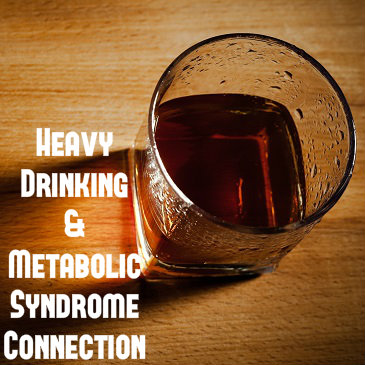Heavy Drinking Tied To Metabolic Syndrome
Metabolic syndrome is the term that doctors and public health officials use to describe a collection of health concerns that significantly increase your chances of dying from heart disease or certain other causes. While some of the risks associated with heavy alcohol consumption are well established, researchers know relatively little about the potential connection between heavy drinking and the development of this syndrome. In a study published in May 2014 in the journal Alcoholism: Clinical & Experimental Research, researchers from Japan’s Hyogo College of Medicine assessed the impact that excessive alcohol intake has on the metabolic syndrome risks of middle-aged men.
Metabolic Syndrome
 Metabolic syndrome gets its name because it involves changes in your normal metabolism, or the processing of chemical reactions inside the brain and body. Strictly speaking, the syndrome is not an illness; instead, it is a collection of risk factors for illness.
Metabolic syndrome gets its name because it involves changes in your normal metabolism, or the processing of chemical reactions inside the brain and body. Strictly speaking, the syndrome is not an illness; instead, it is a collection of risk factors for illness.
Specific factors involved in the onset of metabolic syndrome can include having a tendency to carry significant amounts of excess weight around your midsection, having a high count of a bloodborne fat called triglyceride, having low blood levels of HDL or “good” cholesterol (which removes excess LDL or “bad” cholesterol from your bloodstream), having abnormally high blood glucose or blood sugar levels and having unusually high blood pressure. As a rule, doctors consider making a diagnosis in people affected by a minimum of three of these risk factors.
Compared to the general population, a person with metabolic syndrome has a roughly 100 percent greater chance of developing some form of heart disease, the National Heart Lung and Blood Institute reports. The presence of the syndrome also increases the odds for developing type 2 diabetes by about 400 percent. Physical concerns most commonly associated with a metabolic syndrome diagnosis include maintaining a sedentary lifestyle and carrying enough body weight to qualify as overweight or obese. Other potential concerns include having an unusual resistance to the blood sugar-lowering effects of a human hormone called insulin, being older and having a genetic predisposition toward risk factors for the condition.
Excessive Or Heavy Drinking
Heavy drinking is a public health term used to describe excessive alcohol consumption on any given day or over the course of any given week. Men partake in this form of consumption when they drink more than four servings of alcohol per day or more than 14 servings per week. Women partake in heavy drinking when they consume more than three servings of alcohol per day or more than seven servings per week. Some heavy drinkers also qualify as binge drinkers by consuming enough alcohol to reach a legally intoxicated state in a single, fairly brief bout of alcohol intake. Participation in heavy drinking is conclusively linked with increased risks for developing diagnosable problems with alcohol abuse and/or alcoholism.
Examining The Connection Between Heavy Drinking And Metabolic Syndrome
In the study published in Alcoholism: Clinical & Experimental Research, the Japanese researchers used an assessment of a group of middle-aged men to compare the risks for metabolic syndrome among people in this age group who don’t drink alcohol, occasionally drink heavily and regularly drink heavily. For the purposes of the study, heavy drinking was defined as the consumption of at least 66 grams (2.3 oz) of pure alcohol on any given day when alcohol intake occurred. This is equivalent to the amount of alcohol in 3.8 standard drinks.
The researchers concluded that, compared to middle-aged men who don’t drink, men in this age group who occasionally participate in heavy drinking have a roughly 94 percent higher chance of developing metabolic syndrome. They also concluded that middle-aged men who regularly participate in heavy drinking have a roughly 48 percent higher chance of developing the syndrome. The occasional heavy drinkers are considerably more likely than their non-drinking counterparts to carry significant amounts of excess weight around their midsections. The regular heavy drinkers are considerably less likely than their non-drinking counterparts to have high blood sugar levels.
It may seem odd that occasional heavy drinkers apparently have substantially higher chances of developing metabolic syndrome than regular heavy drinkers. The study’s authors tentatively attribute this counterintuitive finding to the lowered risks for high blood sugar among people who regularly consume excessive amounts of alcohol, as well as to the increased risks for abdominal obesity among people who occasionally consume excessive amounts of alcohol. The authors also specifically note that the cardiovascular (heart and blood vessel) risks for metabolic syndrome apply to both occasional and regular heavy drinkers.



